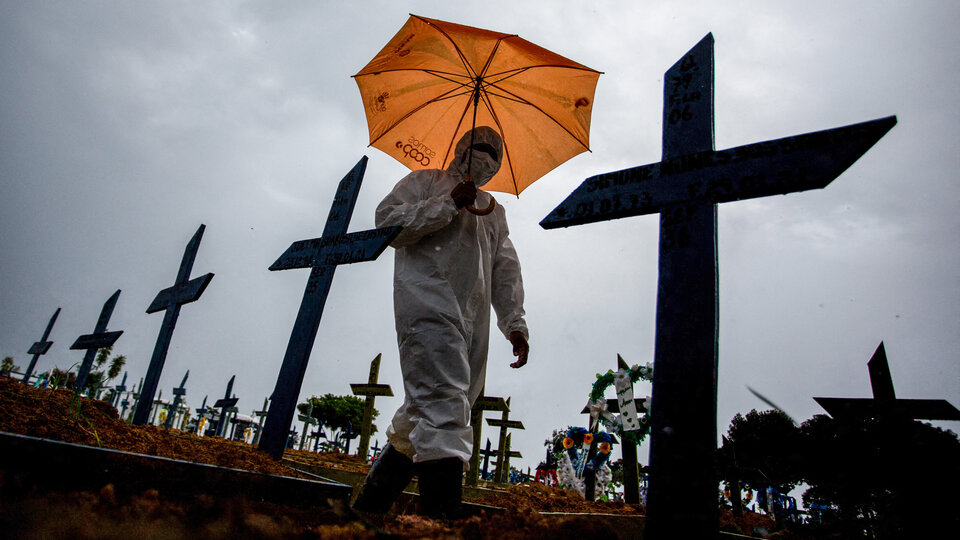
[ad_1]
With death registers, hospitals on the brink of collapse and a slow-motion vaccination campaign, Brazil is living the deadliest phase of the pandemic of the coronavirus without a national strategy to contain it.
The South American giant recorded 1,641 coronavirus deaths on Tuesday and 1,910 on Wednesday, two consecutive records since the first case reported in February 2020. The total number of victims of the disease is close to 260,000, a toll exceeded only by the United States , and 10.7 million infections.
“For the first time since the start of the pandemic, there has been a simultaneous worsening of various indicators across the country,” the prestigious Fiocruz Foundation of the Ministry of Health said this week. This is an “alarming scenario” with an increase in cases and deaths, high levels of severe acute respiratory syndromes (SARS) and over 80% occupancy of beds in intensive care units (ICU). in 19 of the 27 Brazilian states, explained the institution.
Over the past seven days, the average has been 1,331 daily deaths, a figure that until February remained close to 1,100. Since January, the country has failed to reduce the 1,000 deaths per day, as happened between June and August of last year, during the first wave. The death toll shows that restrictions on movement ordered in recent weeks by mayors and governors – and criticized by President Jair Bolsonaro – have been insufficient to stop the pandemic.
Experts say the worrying rebound is the result of a lack of social distancing during the holiday season and southern summer and carnival crowds, despite the latter having been formally banned. Some studies also indicate the new variant of the Amazon coronavirus, called P.1, twice as contagious, already detected in 17 states and causing a global alarm.
“The tip of the iceberg”
Brazil, a country of 212 million people, has had a slow vaccination against covid for a month and a half, due to lack of doses: so far, 7.4 million Brazilians have been vaccinated and only 2.3 million of them with the second dose. “This emergency is not a surprise: it is due to the fact that we did not prepare ourselves, because this scenario was foreseen. We knew that there was a new variant and that there had to be a lockdown,” said the vice president of the Brazilian Society of Immunology (SBIM), Isabella Ballalai.
This Thursday, Rio de Janeiro reimposed restrictions on bars, restaurants and beaches from Friday to, according to its mayor Eduardo Paes, “prevent a repeat of the genocide” of 2020 in the capital Rio de Janeiro. The richest and most populous state of Sao Paulo will return on Saturday for two weeks to the “red phase” of restrictions, which allows the operation of health services, food, public transport and schools, but prohibits the opening of shopping centers, restaurants and exhibition halls.
In Brasilia and in the states of Mato Grosso, Pernambuco, Rondonia and Acre, among more than a dozen, activity has already been reduced to essential services or store opening hours have been limited, with possible night curfews. Even the wealthiest states with more infrastructure, such as Paraná and Santa Catarina (south), are on “critical alert” for the occupancy of intensive care beds. However, Fiocruz warned that the current scenario “represents only the tip of the iceberg of an intense level of transmission” of the coronavirus.
Self management
The urgency and lack of coordination on the part of the federal government pushed mayors and governors to join forces to buy vaccines. State health secretaries on Monday called for a nationwide nighttime curfew and “lockdown” in the most critical areas.
But this position clashes with that of Bolsonaro, who promotes agglomerations with his supporters, questions the use of masks and the effectiveness of vaccines and criticizes authorities who apply social isolation measures for their economic impact. Today, the country is facing both a worsening pandemic and a further sharp downturn in its economy.
The far-right president, with his gaze on the 2022 elections, said last week that governors who order business closures “will have to pay” with their own budgets for economic aid to the poorest populations . “This disagreement between the federal government and the state has been one of the big problems, with a lot of politicization of the subject, and without a doubt that has made the country one of the worst places to handle the pandemic, ”Ballalai said.
.
[ad_2]
Source link
 Naaju Breaking News, Live Updates, Latest Headlines, Viral News, Top Stories, Trending Topics, Videos
Naaju Breaking News, Live Updates, Latest Headlines, Viral News, Top Stories, Trending Topics, Videos